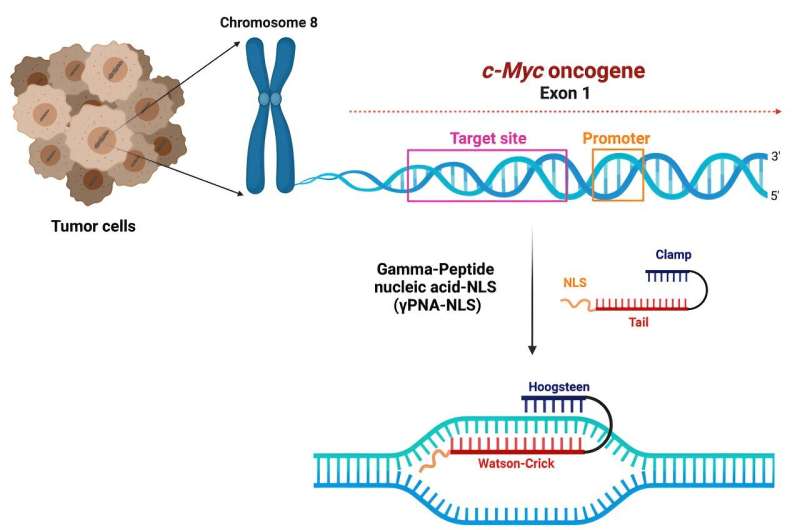This article has been reviewed according to Science X's editorial process and policies. Editors have highlighted the following attributes while ensuring the content's credibility:
fact-checked
peer-reviewed publication
trusted source
proofread
Researchers target double-stranded DNA for cancer therapy

A team of UConn School of Pharmacy researchers have published their work in Cell Reports Medicine, highlighting groundbreaking advancements in treating cancer.
Raman Bahal, Associate Professor in the Department of Pharmaceutical Sciences; Sai Pallavi Pradeep, graduate student; Shipra Malik ('23), scientist at Verve; and Vikas Kumar, a postdoctoral researcher, focus their research on advancements in treating genetic disorders, particularly through DNA targeted medicines.
These advancements have paved the way for precision medicines, offering more targeted and effective treatments. Beyond RNA, there is immense potential in targeting the abnormal expression of genetic DNA for therapeutic purposes. However, inhibiting the transcription process within the cell nucleus, where DNA is located, is challenging.
"Targeting genomic DNA is more challenging since DNA is present in its stable double-stranded form. Also, in addition to the cell membrane, nuclear membranes also need to permeate for effective DNA-targeted technologies," Bahal says. "Most importantly, we established this DNA-targeted technology in multiple pre-clinical studies and are now working on diverse aspects to move this technology forward for cancer therapy."
"This study exclusively shows that the root cause of cancer, that is, the oncogenic DNA, can be targeted for developing new therapies," says Malik. In a landmark achievement, Bahal and his team have successfully targeted double-stranded DNA to inhibit the c-Myc oncogene.
This is a crucial development in cancer therapy, as the c-Myc oncogene is implicated in various cancers such as Burkitt's lymphoma, Diffuse large B-cell lymphomas, breast cancers, prostate cancer, gastrointestinal cancer, multiple myeloma, and myeloid leukemia. By effectively targeting this oncogene at the DNA level, new possibilities for therapeutic interventions in several cancers are emerging.
"I am deeply grateful for the opportunity to have worked and contributed to this groundbreaking study at the commencement of my academic journey," says Pallavi. "Our team rigorously evaluated the efficacy and safety of this novel DNA targeting approach for cancer treatment. I look forward to exploring its potential applications further."
This technology shows promise in advancing the frontiers of cancer research, providing insights into personalized therapeutic interventions. Essentially, this breakthrough opens up avenues for developing more effective and tailored treatments for different types of cancer. "We used comprehensive chemistry and biology-based techniques to target the specific oncogene, which could pave the way for targeting other deleterious cancer genes too," says Vikas Kumar.
"DNA targeting technology has far-reaching implications for human health, especially in the field of cancer biology," says Amit Kumar, Senior Director of Licensing.
"UConn's Technology Commercialization Services office has been working with Dr. Raman Bahal for some time now so that an effective patent strategy for this innovative technology is executed. Simultaneously, we have engaged with various venture capitalists and pharmaceutical/biotech companies, with the overarching goal of facilitating the commercialization of this technology for the benefit of society."
This work was also done in collaboration with Vijender Singh at UConn, Rong Fan and his team, and Juan C. Vasquez at Yale University.
More information: Shipra Malik et al, Antitumor efficacy of a sequence-specific DNA-targeted γPNA-based c-Myc inhibitor, Cell Reports Medicine (2024). DOI: 10.1016/j.xcrm.2023.101354



















